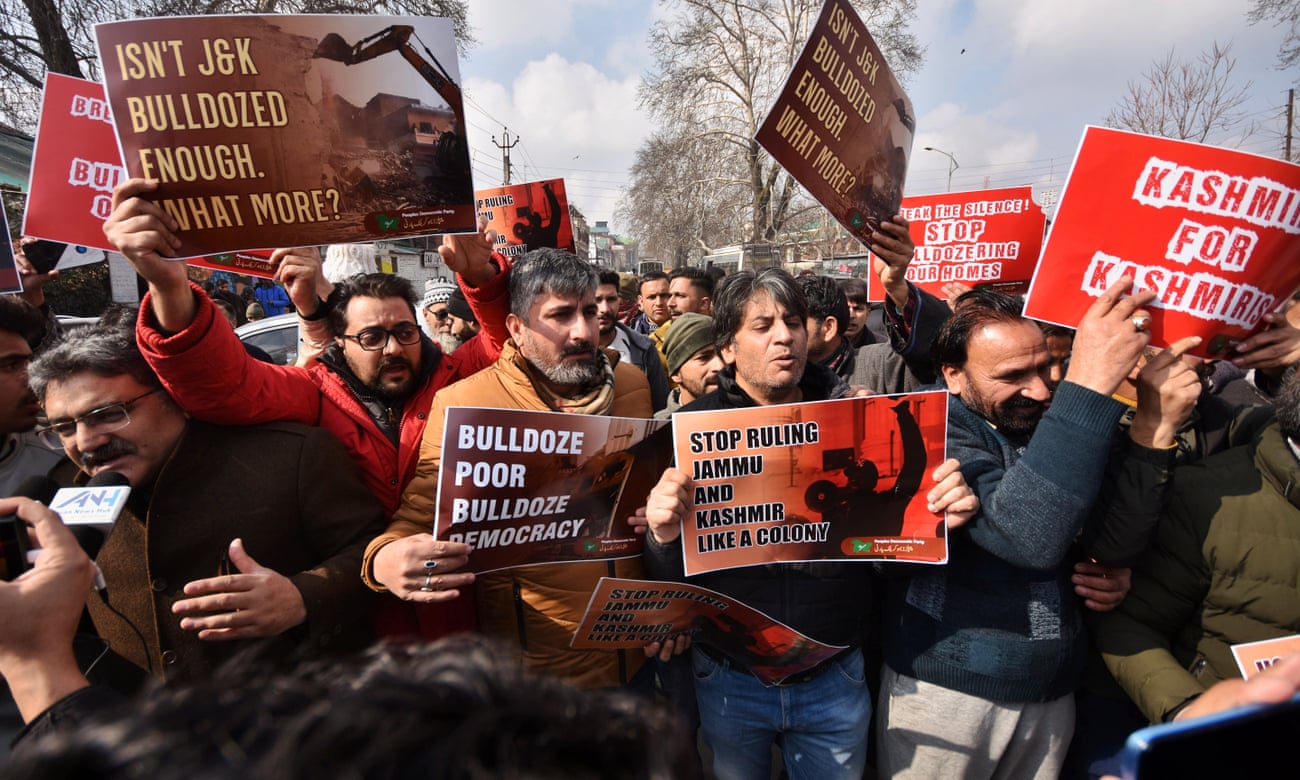by AAKASH HASSAN & HANNAH ELLIS PETERSON

Violence and censorship rife among citizens and the media, as push to reclaim state land belies Indian government’s claims of peace in disputed region
Suhail Ahmad Shah stood despairingly before the wreckage that for two decades had been his livelihood. Just hours before, he had been busy at the workshop when he heard an ominous crunch above him and the tin roof began to cave in. He barely made his escape before a bulldozer flattened the entire place.
“No notice was served to us,” said Shah, 38. “The officials came suddenly and demolished our workshop. No one is listening to us. We’ve been paying rent. Isn’t this an atrocity? They have snatched our livelihood.”
His workshop selling secondhand car parts in Srinagar, the summer capital of the beleaguered Indian state of Kashmir, was just one of dozens of structures across the region caught up in a widespread demolition drive in February. Many of these took place with little notice, even for those who had occupied the land for decades. The purpose, according to the government, was to “retrieve” state land that had been illegally encroached on. More than 50,000 acres of land were seized before the drive was paused.
But in Kashmir, the drive has been condemned as having a more sinister purpose. Many have decried it as part of a wider agenda by the Hindu nationalist government of the Bharatiya Janata Party (BJP), led by prime minister Narendra Modi, to displace and dispossess Kashmiris from their own land and shift the demographics of India’s only Muslim-majority state.
Since the Modi government came to power in 2014, bulldozers have been a popular tool for BJP leaders to target the Muslim minority in their pursuit of a religious nationalist agenda to establish India as a Hindu, rather than secular, country. In states such as Uttar Pradesh, Delhi, Gujarat and Madhya Pradesh, bulldozers have been used to crush the homes of swathes of Muslim activists accused of involvement in protests and of communities alleged to be illegal immigrants.
Panic spread in Kashmir that the BJP’s so-called “bulldozer politics” were being deployed against its Muslims. Mehbooba Mufti, former chief minister of Kashmir, termed the demolition drive “a ruse to further push people to economic margins by demolishing their homes and livelihood”.
Fayaz Ahmad, 52, whose scrapyard of 30 years was demolished without notice or warning, agreed. “This all is being done to suppress Kashmiris,” he said.
Since independence in 1947, the Kashmir region has been the touchstone issue between India and Pakistan. They have gone to war multiple times for control over the disputed territory, which is split between the two countries. On the Indian side was the state of Jammu and Kashmir where, from the early 1990s, a violent separatist insurgency with an allegiance to, and funded by, Pakistan emerged.
Successive governments struggled to bring the violence under control. But in August 2019 the Modi government, fulfilling a long-held promise to its rightwing base, took unilateral action against the state, stripping it of its long-held autonomy and severing it into two territories under central government control. Thousands of troops were moved into the state, the state government was dissolved, local politicians were imprisoned and the world’s longest internet shutdown, lasting 18 months, was imposed.
Since then the BJP has thrown open the doors of the state, allowing outsiders to buy property and register to vote in Kashmir for the first time. More than 2 million new voters have been registered, a source of great concern to the many who believe that the government is trying to change the demographics of the state away from its current Muslim majority.
The Guardian for more
